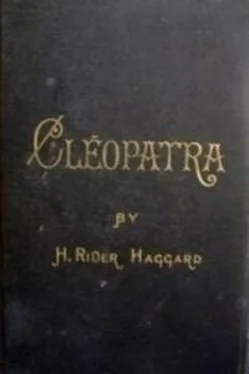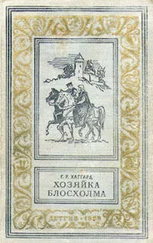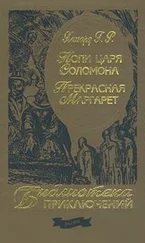"Now where is he?" she muttered. "Osiris—glory to His name—send that he has not wandered in the night, and he blind! Alack! that I could not return before the dark. Alack! and alack! what times have we fallen on, when the Holy High Priest and the Governor, by descent, of Abouthis, is left with one aged crone to minister to his infirmity! O Harmachis, my poor boy, thou hast laid trouble at our doors! Why, what's this? Surely he sleeps not, there upon the ground?—'twill be his death! Prince! Holy Father! Amenemhat! awake, arise!" and she hobbled towards the corpse. "Why, how is it! By Him who sleeps, he's dead! untended and alone— dead! dead! " and she sent her long wail of grief ringing up the sculptured walls.
"Hush! woman, be still!" I said, gliding from the shadows.
"Oh, what art thou?" she cried, casting down her basket. "Wicked man, hast thou murdered this Holy One, the only Holy One in Egypt? Surely the curse will fall on thee, for though the Gods do seem to have forsaken us now in our hour of trial, yet is their arm long, and certainly they will be avenged on him who hath slain their anointed!"
"Look on me, Atoua," I cried.
"Look! ay, I look—thou wicked wanderer who hast dared this cruel deed! Harmachis is a traitor and lost far away, and Amenemhat his holy father is murdered, and now I'm all alone without kith or kin. I gave them for him. I gave them for Harmachis, the traitor! Come, slay me also, thou wicked one!"
I took a step toward her, and she, thinking that I was about to smite her, cried out in fear:
"Nay, good Sir, spare me! Eighty and six, by the Holy Ones, eighty and six, come next flood of Nile, and yet I would not die, though Osiris is merciful to the old who served him! Come no nearer—help! help!"
"Thou fool, be silent," I said; "knowest thou me not?"
"Know thee? Can I know every wandering boatman to whom Sebek grants to earn a livelihood till Typhon claims his own? And yet—why, 'tis strange—that changed countenance!—that scar!—that stumbling gait! It is thou, Harmachis!—'tis thou, O my boy! Art come back to glad mine old eyes? I hoped thee dead! Let me kiss thee?—nay, I forget. Harmachis is a traitor, ay, and a murderer! Here lies the holy Amenemhat, murdered by the traitor, Harmachis! Get thee gone! I'll have none of traitors and of parricides! Get thee to thy wanton!—it is not thou whom I did nurse."
"Peace! woman; peace! I slew not my father—he died, alas!—he died even in my arms."
"Ay, surely, and cursing thee, Harmachis! Thou hast given death to him who gave thee life! La! la! I am old, and I've seen many a trouble; but this is the heaviest of them all! I never liked the looks of mummies; but I would I were one this hour! Get thee gone, I pray thee!"
"Old nurse, reproach me not! Have I not enough to bear?"
"Ah! yes, yes!—I did forget! Well; and what is thy sin? A woman was thy bane, as women have been to those before thee, and shall be to those after thee. And what a woman! La! la! I saw her, a beauty such as never was—an arrow pointed by the evil Gods for destruction! And thou, a young man bred as a priest—an ill training—a very ill training! 'Twas no fair match. Who can wonder that she mastered thee? Come, Harmachis; let me kiss thee! It is not for a woman to be hard on a man because he loved our sex too much. Why, that is but nature; and Nature knows her business, else she had made us otherwise. But here is an evil case. Knowest thou that this Macedonian Queen of thine hath seized the temple lands and revenues, and driven away the priests—all, save the holy Amenemhat, who lies here, and whom she left, I know not why; ay, and caused the worship of the Gods to cease within these walls. Well, he's gone!—he's gone! and indeed he is better with Osiris, for his life was a sore burden to him. And hark thou, Harmachis: he hath not left thee empty–handed; for, so soon as the plot failed, he gathered all his wealth, and it is large, and hid it—where, I can show thee—and it is thine by right of descent."
"Talk not to me of wealth, Atoua. Where shall I go and how shall I hide my shame?"
"Ah! true, true; here mayst thou not abide, for if they found thee, surely they would put thee to the dreadful death—ay, to the death by the waxen cloth. Nay, I will hide thee, and, when the funeral rites of the holy Amenemhat have been performed, we will fly hence, and cover us from the eyes of men till these sorrows are forgotten. La! la! it is a sad world, and full of trouble as the Nile mud is full of beetles. Come, Harmachis, come."
Chapter III
Of the Life of Him Who Was Named the Learned Olympus, in the Tomb of the Harpers That is by tÁpÉ; of His Counsel to Cleopatra; of the Message of Charmion; and of the Passing of Olympus Down to Alexandria
These things then came to pass. For eighty days I was hidden of the old wife, Atoua, while the body of the Prince, my father, was made ready for burial by those skilled in the arts of embalming. And when at last all things were done in order, I crept from my hiding–place and made offerings to the spirit of my father, and placing lotus–flowers on his breast went thence sorrowing. And on the following day, from where I lay hid, I saw the Priests of the Temple of Osiris and of the holy shrine of Isis come forth, and in slow procession bear his painted coffin to the sacred lake and lay it beneath the funeral tent in the consecrated boat. I saw them celebrate the symbol of the trial of the dead, and name him above all men just, and then bear him thence to lay him by his wife, my mother, in the deep tomb that he had hewn in the rock near to the resting–place of the Holy Osiris, where, notwithstanding my sins, I, too, hope to sleep ere long. And when all these things were done and the deep tomb sealed, the wealth of my father having been removed from the hidden treasury and placed in safety, I fled, disguised, with the old wife, Atoua, up the Nile till we came to Tápé, [21] Thebes.—Editor.
and here in this great city I lay a while, till a place could be found where I should hide myself.
And such a place I found. For to the north of the great city are brown and rugged hills, and desert valley blasted of the sun, and in this place of desolation the Divine Pharaohs, my forefathers, hollowed out their tombs in the solid rock, the most part of which are lost to this day, so cunningly have they been hidden. But some are open, for the accursed Persians and other thieves broke into them in search of treasure. And one night—for by night only did I leave my hiding–place—just as the dawn was breaking on the mountain tops, I wandered alone in this sad valley of death, like to which there is no other, and presently came to the mouth of a tomb hidden amid great rocks, which afterwards I knew for the place of the burying of the Divine Rameses, the third of that name, now long gathered to Osiris. And by the faint light of the dawn creeping through the entrance I saw that it was spacious and that within were chambers.
On the following night, therefore, I returned, bearing lights, with Atoua, my nurse, who ever ministered faithfully to me as when I was little and without discretion. And we searched the mighty tomb and came to the great Hall of the Sarcophagus of granite, in which the Divine Rameses sleeps, and saw the mystic paintings on the walls: the symbol of the Snake unending, the symbol of Ra resting upon the Scarabæus, the symbol of Ra resting upon Nout, the symbol of the Headless men, and many others, whereof, being initiated, well I read the mysteries. And opening from the long descending passage I found chambers in which were paintings beautiful to behold, and of all manner of things. For beneath each chamber is entombed the master of the craft of which the paintings tell, he who was the chief of the servants of that craft in the house of this Divine Rameses. And on the walls of the last chamber—on the left–hand side, looking toward the Hall of the Sarcophagus—are paintings exceedingly beautiful, and two blind harpers playing upon their bent harps before the God Mou; and beneath the flooring these harpers, who harp no more, are soft at sleep. Here, then, in this gloomy place, even in the tomb of the Harpers and the company of the dead, I took up my abode; and here for eight long years I worked out my penance and made atonement for my sin. But Atoua, because she loved to be near the light, abode in the chamber of the Boats—that is, the first chamber on the right–hand side of the gallery looking toward the Hall of the Sarcophagus.
Читать дальше









